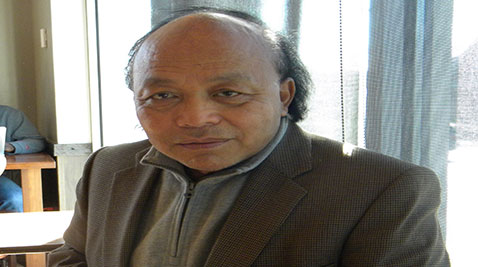The Rev. Peter Sum, a senior pastor at the Gospel Baptist Church of the World in Frederick, said he used to have health insurance through his wife’s employer.
But when Grace Sum left her job, the coverage went away. Sum said that since his church cannot afford to provide health insurance, the family turned to the Affordable Care Act.
So, during the first enrollment period last year, Sum, a Burmese immigrant, attended a health fair sponsored by the Asian American Center of Frederick. There, he was assisted by the staff of Healthy Howard Inc., who enrolled him, his wife and two of their children into a plan through Maryland Health Connection, the state’s version of the Affordable Care Act insurance marketplace.
“For our part it was very, very easy just giving them information only,” Sum said. “They helped us out with everything, from start to finish.”
The second enrollment period begins Saturday, but in multicultural Maryland, effectively disseminating information to residents on how to go about signing up for coverage is a task much easier said than done. This is where partnerships between health agencies and community-based organizations have played a key role in reaching out to different ethnic groups, such as Asian Americans like Rev. Sum.
Asian Americans in Maryland
Nearly 78,700 Marylanders signed up for private health insurance through Maryland Health Connection last year. But there is no data for how many of them were Asian American, who make up about 6 percent of Maryland residents, according to the latest Census data.
At the national level, the data is also sparse. A report released in September by the Action for Health Justice says nearly 600,000 Asian Americans, Native Hawaiians and Pacific Islanders were reached through education and enrollment assistance during the first enrollment period. But that was just what was reported by the group’s 70 community-based partners in 22 states.

Because many Asian Americans are low-income and uninsured, experts say they stand to benefit from signing up for insurance or Medicaid through the Affordable Care Act. This makes collaborations like the one between the Asian American Center of Frederick and Healthy Howard Inc., critical to making sure they don’t fall through the cracks.
“Obviously language and different cultural backgrounds can always pose a barrier to gaining health insurance, using health insurance, purchasing the right health insurance,” said Sophie McCormick, who as a “Navigator” for Healthy Howard Inc. helps consumers sign up for insurance.
She said they have worked hard to provide health information to Frederick County’s Asian-American community, which is about 10,000 strong, or 4 percent of the population.
The center’s Executive Director Elizabeth Chung said her diverse staff has allowed them to help translate information and do direct outreach about Obamacare in various languages.
“Given the Chinese communities we have three or four different dialects. South Asians about eight different dialects,” Chung said. “So we have the capacity to reach out and do education.”
Cultural Competence Also Required
But linguistic competence is not the only factor – there is also a cultural component.
In Montgomery County, where about 42 percent of the state’s Asian-American population resides, the county health department has worked through one of its own offices to bridge that divide.

The Asian American Health Initiative Program Director Perry Chan said they have specifically tried to send people out into the community who speak the same language and understand the culture to deliver Obamacare information. He said this helps in reaching those who don’t get out to the health fairs.
“A lot of people work in small business, they are blue collar, their employer may not be able to provide them health insurance,” Chan said. “So these people have been uninsured and keeping silent.”
Phuong Ngo is one of the more than two dozen navigators Montgomery County has hired. She said, among them, they speak no fewer than 10 languages.
Ngo has helped Chan with outreach to the Vietnamese community, and said she sometimes has to get creative when explaining complex insurance terms like “premium” or “deductible.”
“Some people don’t even know what it is in English, so you kind of have to go use examples, you know, real life scenarios,” Ngo said. “I mean, pretty much everyone has car insurance, so I would use that. If you were paying a deductible on that, it’s kind of the same thing with health care.”
Ngo said she’s been able to dispel a lot of mistrust and misinformation about the new health care law within the Vietnamese community by just being able to communicate with them.
Sum said what these community organizations are managing to get done is good work that’s benefiting the most needy in the Asian American community.
“And they are doing, I would say, the job nearest to the heart of Jesus Christ. To help the unhelped,” he said.


You must be logged in to post a comment.